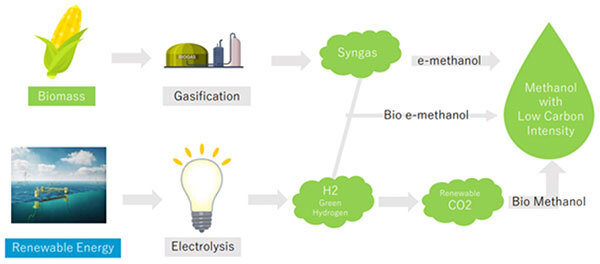Mitsui O.S.K. Lines today announced the signing of an agreement with Mitsubishi Gas Chemical Company, on 28th April, 2023 for the long-term charter of a methanol carrier, which can run on either methanol or conventional heavy fuel oil.
The vessel will be the first dual-fuel methanol carrier to sail under a long-term charter for a Japanese company, and with the signing of the basic agreement, the two companies aim to further expand their cooperative relationship. It is slated for delivery in 2025, will be built at Hyundai Mipo Dockyard.
Since MOL delivered Japan’s first methanol carrier, the Kohzan Maru (first generation), to Mitsubishi Gas Chemical in 1983, the two companies have built a partnership centered on the ocean transport of methanol.
Vessel specifications:
- DWT: About 47,802 tons
- Main engine: HYUNDAI-MAN B&W 6G50ME-C9.6-LGIM-EGRBP
Methanol advantages:
- E-methanol offers many advantages compared to fossil fuels such as diesel, heavy fuel oil and LNG but also to e-ammonia.
- In the event of a leak, methanol dissolves very quickly in water.
- Vapors released into the air are also dispersed quickly.
- There are already safety guidelines for methanol in shipping in place, as well as empirical data from ships already operating on methanol.
- The risks to marine ecosystems are manageable and significantly lower compared to today’s fuels or ammonia.
- Above all, risks are much lower than with toxic heavy fuel oil that is used on many ships today and frequently leads to the contamination of entire regions.
Methanol disadvantages:
- Production is still currently mainly via processing natural gas (grey methanol) or coal (brown methanol), limiting the reduction of CO2 emissions.
- Only when methanol is produced using renewable sources like biomass, and if the power used to produce it comes from renewable energy, it is considered to be green methanol.
- Lower energy density than conventional fuel oil.
- Large fuel volume is almost 2.5 times fuel oil, so requires larger storage tanks and/or more frequent bunkering.
- Low flash point of well below 60°C is a fire risk, requiring extra fire prevention measures when handled and stored.
- Toxic if inhaled, ingested or handled.
- Increased corrosion risks. Apart from larger volume of fuel tanks, additional cofferdams will be needed to prevent any potential leak into machinery spaces.
To remind, MOL announced a few months ago that on January 17 it took delivery of the Cypress Sun, a dual-fuel methanol carrier that can run on either methanol or conventional heavy fuel oil.

































































